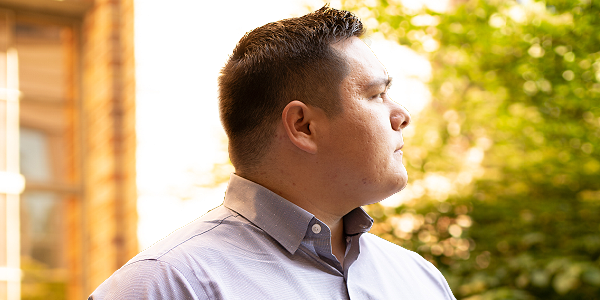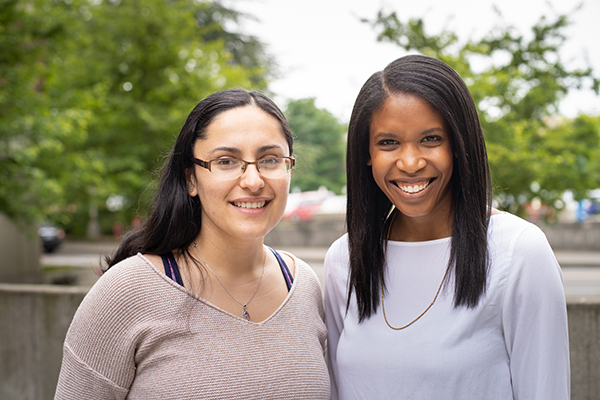When Gabriel Cortez was planning for graduate school, he considered attending the University of Washington School of Public Health, but the expense loomed like a mountain to climb. The School was far from his small hometown of Aztec, New Mexico, and Seattle was a pricey place to live.

His mind was changed, in a sudden way, while he stood in a crowd during a visit to campus for admitted students. After worrying all day and talking with others about the financial challenge, a faculty member unexpectedly congratulated him. Cortez learned he had been chosen to receive a grant known as the Health Services Equity, Excellence and Distinction Award, or HSEED.
“That award set the stage for me to receive other financial aid,” said Cortez, who enrolled in the fall of 2016. “And now I’m here at one of the best schools in the nation.”
Cortez is set to graduate in June with a Master of Public Health in Community-Oriented Public Health Practice, or COPHP. A member of the Navajo Nation, Cortez hopes to one day evaluate health programs and systems so that they serve Native groups more effectively and equitably. “I bring a unique lens to the work, being Native and understanding the nuances of our communities,” he said.
Cortez was drawn to the UW in part because of the proximity to local tribes and the indigenous services and student groups. Jeffrey Harris, MD, MPH, MBA, chair of the Department of Health Services, helped create the HSEED grants, which are given to eight admitted students each year. “We can better serve our communities if we have students that look like the people we serve,” said Harris, who spent 20 years at the Centers for Disease Control and Prevention and the U.S. Public Health Service. Harris saw some public health measures fall short because the messages did not reach communities in the right voice or platform. “We need people of color in decision-making roles, and making decisions about where to put resources and how to reach out.”

Soon after he became chair in 2015, Harris created the HSEED. He and his wife, Judith Wasserheit, MD, MPH, personally contributed to the cause. The first set of students received grants in 2016. Each individual degree program in the department also contributes some of its funds. Many students qualify for additional dollars from GO-MAP, the Graduate Opportunities and Minority Achievement Program. One of GO-MAP’s guiding principles is the idea that “access without support does not equal opportunity.”
Cortez was attracted to the UW partly because of the practice-based pedagogy in COPHP. Students learn while practicing skills and “that’s a big piece of how the real world happens,” he said. For his capstone project this year, Cortez is studying the influence of public school start times on student performance. He’s been working with Michelle Garrison (MPH ‘99, PhD ‘06, Epidemiology) and Seattle Children’s Maida Chen, MD, who researches sleep and public health. He is analyzing metrics such as attendance, disciplinary action and standardized test scores, then comparing numbers from before and after start times were delayed in some Seattle schools.
Among others who received HSEED grants are Esmeralda Switzer, who described her award as “more than monetary assistance – it’s hope, support and encouragement.” She has been working at Sea Mar Community Health Centers and plans to graduate with a Master of Health Administration.
Noelia Flores-Silver, from the Rio Grande Valley in Texas, is another HSEED recipient. She is the first in her family to graduate from college and is pursuing her MPH in health systems and policy. Flores-Silver hopes to improve systems for health back home. “Without the HSEED award, I would have stressed over my finances, and lost my flexibility in acquiring valuable experiences in my field of interest,” she wrote.
HSEED students are chosen for outstanding academic merit, diversity of experiences and backgrounds, and potential for leadership in public health. Each recipient is chosen by the program directors and admissions committee members representing the eight Department of Health Services graduate programs, explained Steve Berard, academic programs manager. Unlike other scholarships that may draw from a much bigger pool of candidates competing largely on grades and test scores, Health Services staff and faculty often hold face-to-face discussions with potential students in a more holistic, interpersonal review process. This allows the selection committees to better gauge an applicant’s commitment to improving the conditions or systems that lead to poor health outcomes.
“This program is special because it is department driven and localized,” Berard said. “We are very familiar with the candidates and able to choose prospective students who will contribute to the diversity of our programs in many ways.”
To learn more about the HSEED award or to make a gift, contact Megan Kagel at mkingram@uw.edu or (206) 616- 7197
(By Sally James for the UW School of Public Health)
